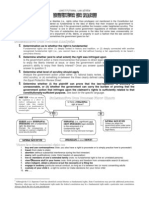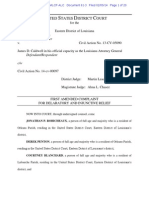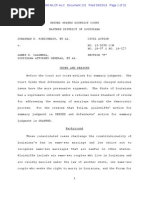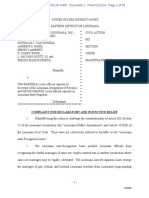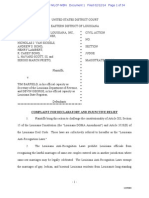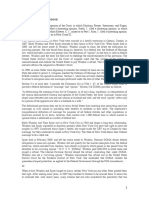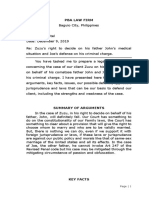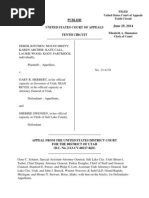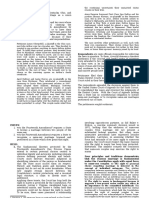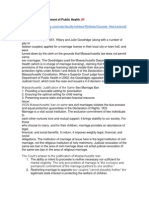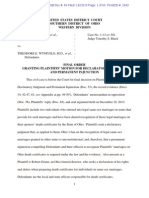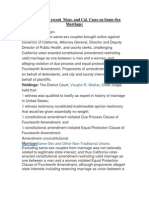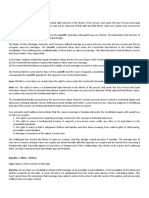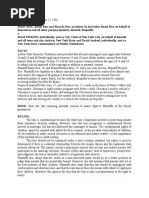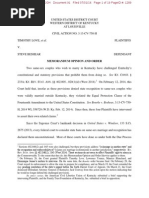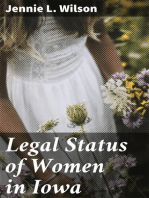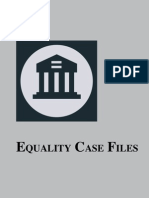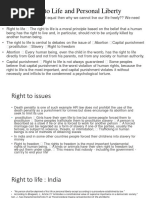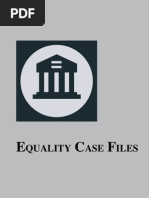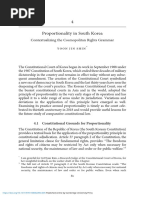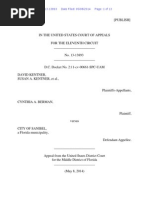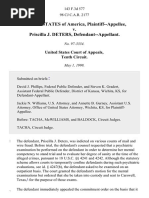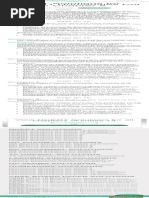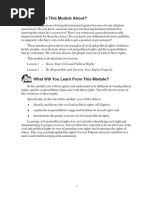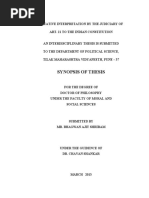2:14-cv-00097 #1 - Complaint
2:14-cv-00097 #1 - Complaint
Uploaded by
Equality Case FilesCopyright:
Available Formats
2:14-cv-00097 #1 - Complaint
2:14-cv-00097 #1 - Complaint
Uploaded by
Equality Case FilesOriginal Description:
Copyright
Available Formats
Share this document
Did you find this document useful?
Is this content inappropriate?
Copyright:
Available Formats
2:14-cv-00097 #1 - Complaint
2:14-cv-00097 #1 - Complaint
Uploaded by
Equality Case FilesCopyright:
Available Formats
Case 2:14-cv-00097-MLCF-ALC Document 1 Filed 01/14/14 Page 1 of 18
UNITED STATES DISTRICT COURT
for the Eastern District of Louisiana Jonathan P. Robicheaux et al Plaintiff/Petitioner v. Civil Action No. _______________ Devin George in his official capacity as the State Registrar and Center Director at Louisiana Department of Health and Hospitals, et al Defendant/Respondent COMPLAINT FOR DELARATORY AND INJUNCTIVE RELIEF
NOW INTO COURT, through undersigned counsel, come JONATHAN P. ROBICHEAUX, a person of full age and majority who is a resident of Orleans Parish, residing in the United States District Court, Eastern District of Louisianas district, DEREK PENTON, a person of full age and majority who is a resident of Orleans Parish, residing in the United States District Court, Eastern District of Louisianas district, COURTNEY BLANCHARD, a person of full age and majority who is a resident of Lafourche Parish, residing in the United States District Court, Eastern District of Louisianas district, and NADINE BLANCHARD, a person of full age and majority who is a resident of Lafourche Parish, residing in the United States District Court, Eastern District of Louisianas district, and respectfully represent:
THE PARTIES 1. Made defendants herein are: Devin George in his official capacity as State Registrar and Center Director at Louisiana Department of Health and Hospitals; Tim Barfield in his official capacity as Secretary, Louisiana Department of Revenue; and Kathy Kliebert in her official capacity as Secretary, Louisiana Department of Health and Hospitals. 2. The Plaintiff, Jon Robicheaux, is a man residing in Louisiana who was legally married to his Husband, Plaintiff, Derek Robicheaux in Clayton County, Iowa on September 23, 2012 after having been in a committed relationship together since 2005 commingling funds, living together and holding themselves out as monogamous partners that are living together as one union. 3. The Plaintiff, Courtney Blanchard, is a woman residing in Louisiana who was legally married to her Wife, Plaintiff, Nadine Blanchard in Clinton County, Iowa on August 30, 2013 after having been in a committed relationship with a child, C.B., commingling funds, living together and holding themselves out as monogamous partners that are living together as one union. JURISDICTION AND VENUE 4.
Third Amended Complaint - Robicheaux et al v. George et al Page 2
This Court has jurisdiction over this matter pursuant to 28 U.S.C. 1331 and 1343 because the suit raises federal questions under 42 U.S.C. 1983, the United States Constitution, including without limitation the Fourteenth Amendment. 5. Venue is proper in the United States District Court for the Eastern District of Louisiana under 28 U.S.C. 1391(b)(2) because the Defendants perform their official duties in this district, as well as throughout the State of Louisiana, and this is the judicial district in which a substantial part of the events or omissions giving rise to the claim occurred, or a substantial part of property that is the subject of the action is situated. FACTUAL BACKGROUND 6. The State of Louisiana prevents any official or court of the State of Louisiana from recognizing a valid marriage from another State or Country that is between a same-sex couple, thus depriving a legally married same-sex couple from securing any benefits of marriage within the State of Louisiana and stripping them of any rights to which a same-sex couple was vested prior to residing in the State of Louisiana. The State Laws at Issue 7. On September 18, 2004 by popular vote, an amendment was made to the Louisiana Constitution that reads as follows: Article XII, Section 15. Marriage in the state of Louisiana shall consist only of the union of one man and one woman. No official or court of the state of Louisiana shall construe this constitution or any state law to require that marriage or the legal incidents thereof be conferred upon any member of a union other than the
Third Amended Complaint - Robicheaux et al v. George et al Page 3
union of one man and one woman. A legal status identical or substantially similar to that of marriage for unmarried individuals shall not be valid or recognized. No official or court of the state of Louisiana shall recognize any marriage contracted in any other jurisdiction which is not the union of one man and one woman. 8. Article 3520 of the Louisiana Civil Code reads as follows: Art. 3520. Marriage A. A marriage that is valid in the state where contracted, or in the state where the parties were first domiciled as husband and wife, shall be treated as a valid marriage unless to do so would violate a strong public policy of the state whose law is applicable to the particular issue under Article 3519. B. A purported marriage between persons of the same sex violates a strong public policy of the state of Louisiana and such a marriage contracted in another state shall not be recognized in this state for any purpose, including the assertion of any right or claim as a result of the purported marriage. Acts 1991, No. 923, 1, eff. Jan. 1, 1992; Acts 1999, No. 890, 1. Same-Sex and Opposite-Sex Couples Are Similarly Situated for Purposes of Marriage Benefits 9. The United State Supreme Court has called marriage the most important relation in life, Zablocki v. Redhail, 434 U.S. 374,384 (1978) (internal quotation marks omitted), and an expression of emotional support and public commitment. Turner v. Safely, 482 U.S. 78, 95 (1987). It is "a far-reaching legal acknowledgement of the intimate relationship between two people...." United States v. Windsor, No. 12-307, Slip Op., at 20 (U.S. June 26, 2013). This is as true for same-sex couples as it is for opposite-sex couples.
Third Amended Complaint - Robicheaux et al v. George et al Page 4
10. Same-sex couples such as Plaintiffs are identical to opposite-sex couples in all of the characteristics relevant to marriage.
11. Same-sex couples make the same commitment to one another as opposite-sex couples. Like opposite-sex couples, same-sex couples build their lives together, plan their futures together and hope to grow old together. Like opposite-sex couples, same-sex couples support one another emotionally and financially and take care of one another physically when faced with injury or illness. 12. Same-sex couples who marry are just as willing and able as opposite-sex couples to assume the obligations of marriage. 13. The Plaintiffs and other same-sex couples in Louisiana, if their marriages in other states in which marriage is legal were recognized, would benefit no less than opposite-sex couples from the many legal protections and the social recognition afforded to married couples. 14. There was a time when an individual's sex was relevant to his or her legal rights and duties within the marital relationship. For example, husbands had a duty to support their wives but not vice versa and husbands had legal ownership of all property belonging to their wives. But these legal distinctions have all been removed such that the legal rights and duties of husbands and wives are now identical.
Third Amended Complaint - Robicheaux et al v. George et al Page 5
15. The exclusion from marriage undermines the Plaintiffs abilities to achieve the life goals and dreams with their spouses; threatens their mutual economic stability; and denies them "a dignity and status of immense import." United States v. Windsor, No. 12-307, Slip Op., at 18 (U.S. June 26, 2013). The Exclusion of Same-Sex Couples from the Recognition of Marriage and the Benefits of Marriage Causes Substantial Harm to Couples and Their Families 16. By refusing to recognize same-sex marriage marriages from others states, the States laws deprive same-sex couples married in other states of numerous legal protections that are available to opposite-sex couples in Louisiana by virtue of their marriages. By way of example only: The State provides that a living spouse is entitled to benefits upon the death of his or her spouse should the decedent die intestate. Louisiana Civil Code Art. 890. There is no protection for the widow or widower for same-sex spouses married in another State in which they were legally and properly married. 17. Same-sex married couples are excluded from this and many other legal protections provided for married couples under Louisiana law. 18. The exclusion of same-sex couples from marriage also denies them eligibility for numerous federal protections afforded to married couples including in the areas of immigration and citizenship, taxes, and social security. Some of the federal protections for married couples are only available to couples if their marriages are legally recognized in the state in which they
Third Amended Complaint - Robicheaux et al v. George et al Page 6
live. See, e.g., 42 U.S.C. 416(h)(1)(A)(i) (marriage for eligibility for social security benefits based on law of state where couple resides at time of application); 29 C.F.R. 825.122(b) (same for Family Medical Leave Act). Thus, even Plaintiffs, who are already married, cannot access such federal protections as long as Louisiana refuses to recognize their existing marriage. 19. The exclusion from marriage also harms same-sex couples and their families in less tangible ways. 20. Although the Plaintiffs are in long-term committed relationships, they and other same-sex couples are denied the stabilizing effects of marriage, which helps keep couples together during times of crisis or conflict. 21. Excluding same-sex married couples from recognizing their marriages also harms couples and their children by denying them the social recognition that comes with marriage. Marriage has profound social significance both for the couple that gets married and the family, friends and community that surround them. The terms "married" and "spouse" have universally understood meanings that command respect for a couple's relationship and the commitment they have made. 22. The exclusion from the esteemed institution of marriage also demeans and stigmatizes lesbian and gay couples and their children by sending the message that they are less worthy and valued than families headed by opposite-sex couples.
Third Amended Complaint - Robicheaux et al v. George et al Page 7
23. The impact of the exclusion from marriage on same-sex couples and their families is extensive and real. The denial of the right to marry causes these couples and their families to suffer significant emotional, physical, and economic hardships. 24. The plaintiffs recognize that marriage entails both benefits to and obligations on the partners and welcomes both. Excluding Same-Sex Couples from the Recognition and Benefits of Marriage Is Not Rationally Related to a Legitimate Government Interest Let Alone Able to Withstand Heightened Scrutiny 25. As the evidence will show, the prohibition against recognition of marriage for same-sex couples in Louisiana is not closely tailored to serve an important government interest or substantially related to an exceedingly persuasive justification. In fact, as the evidence also will show, the prohibition fails any level of constitutional scrutiny. It is not even rationally related to any legitimate justifications that were offered in support of it when the Constitution was amended in 2004 or to any legitimate interest of the State that Defendants might now offer as a basis for denying same-sex married couples recognition in Louisiana. 26. The Supreme Court has made clear that the law cannot, directly or indirectly, give effect to private biases and has expressly rejected moral disapproval of marriage for same-sex couples as a legitimate basis for discriminatory treatment of lesbian and gay couples. Windsor, Slip Op.,
Third Amended Complaint - Robicheaux et al v. George et al Page 8
at 21 (an "interest in protecting traditional moral teachings reflected in heterosexual-only marriage laws" was not a legitimate justification for federal Defense of Marriage Act). The State of Louisiana Is Not Entitled to Ignore the Constitution of the United States by Amending its Constitution and Enacting Laws to Enshrine Its Prejudices That Have No Legitimate State Interest 27. As stated by Chief Justice Marshall in McCulloch v. Maryland, 17 US 316: This Government is acknowledged by all to be one of enumerated powers. The principle that it can exercise only the powers granted to it would seem too apparent to have required to be enforced by all those arguments which its enlightened friends, while it was depending before the people, found it necessary to urge; that principle is now universally admitted. But the question respecting the extent of the powers actually granted is perpetually arising, and will probably continue to arise so long as our system shall exist. In discussing these questions, the conflicting powers of the General and State Governments must be brought into view, and the supremacy of their respective laws, when they are in opposition, must be settled. If any one proposition could command the universal assent of mankind, we might expect it would be this -- that the Government of the Union, though limited in its powers, is supreme within its sphere of action. This would seem to result necessarily from its nature. It is the Government of all; its powers are delegated by all; it represents all, and acts for all. Though any one State may be willing to control its operations, no State is willing to allow others to control them. The nation, on those subjects on which it can act, must necessarily bind its component parts. But this question is not left to mere reason; the people have, in express terms, decided it by saying, [p406] "this Constitution, and the laws of the United States, which shall be made in pursuance thereof," "shall be the supreme law of the land," and by requiring that the members of the State legislatures and the officers of the executive and judicial departments of the States shall take the oath of fidelity to it. The Government of the United States, then, though limited in its powers, is supreme, and its laws, when made in pursuance of the Constitution, form the supreme law of the land, "anything in the Constitution or laws of any State to the contrary notwithstanding."
Third Amended Complaint - Robicheaux et al v. George et al Page 9
CLAIMS FOR RELIEF COUNT I: Deprivation of the Fundamental Right to Marry in Violation of the Due Process Clause of the Fourteenth Amendment to the United States Constitution (42 U.S.C. 1983) 28. Plaintiffs incorporate by reference all of the preceding paragraphs of this Complaint as though fully set forth herein. 29. The Fourteenth Amendment to the United States Constitution precludes any State from "depriv[ing] any person of life, liberty, or property, without due process of law." U.S. Const. amend. XIV, 1. Governmental interference with a fundamental right may be sustained only upon a showing that the legislation is closely tailored to serve an important governmental interest. 30. The Supreme Court has long recognized that marriage is a fundamental right and that choices about marriage, like choices about other aspects of family, are a central part of the liberty protected by the Due Process Clause. 31. Louisiana law denies the Plaintiffs and other individuals in same-sex marriages this fundamental right by denying them access to the state-recognized institution of marriage and refusing to recognize the marriages they entered into in other states and countries.
Third Amended Complaint - Robicheaux et al v. George et al Page 10
32. The State can demonstrate no important interest to justify denying the Plaintiffs this fundamental right. Indeed, it cannot demonstrate that the denial is tailored to any legitimate interest at all. 33. The State's refusal to recognize marriages entered into by same-sex couples in other jurisdictions and prohibition for the courts and officials of the State from doing so violates the Due Process Clause. 34. The Defendants, acting under color of state law, are depriving Plaintiffs of rights secured by the Due Process Clause of the Fourteenth Amendment to the United States Constitution in violation of 42 U.S.C. 1983. COUNT II: Discrimination on the Basis of Sexual Orientation in Violation of the Equal Protection Clause of the Fourteenth Amendment to the United States Constitution (42 U.S.C. 1983) 35. Plaintiffs incorporate by reference all of the preceding paragraphs of this Complaint as though fully set forth herein. 36. The Equal Protection Clause of the Fourteenth Amendment to the United States Constitution provides that "no State shall ... deny to any person within its jurisdiction the equal protection of the laws." U.S. Const. amend. XIV, 1.
Third Amended Complaint - Robicheaux et al v. George et al Page 11
37. By denying the Plaintiffs and other lesbian and gay couples the ability have their out-ofstate marriages recognized, the State, through Defendants, disadvantages lesbian and gay people on the basis of their sexual orientation. It denies them significant legal protections. And it "degrade[s] [and] demean[s]" them by "instruct[ing] ...all persons with whom same-sex couples interact, including their own children," that their relationship is "less worthy" than the relationships of others. Windsor, Slip Op., at 25. 38. Same-sex couples and opposite-sex couples are similarly situated for purposes of marriage. 39. The evidence will show that classifications based on sexual orientation demand heightened scrutiny. 40. Lesbians and gay men are members of a discrete and insular minority that has suffered a history of discrimination in the State and across the United States. 41. Sexual orientation bears no relation to an individual's ability to perform or contribute to society. 42. Sexual orientation is a core, defining trait that is so fundamental to one's identity that a person may not legitimately be required to abandon it (even if that were possible) as a condition
Third Amended Complaint - Robicheaux et al v. George et al Page 12
of equal treatment. Sexual orientation generally is fixed at an early age and highly resistant to change through intervention. Efforts to change a person's sexual orientation through interventions by medical professionals have not been shown to be effective. No mainstream mental health professional organization approves interventions that attempt to change sexual orientation, and many including the American Psychological Association and the American Psychiatric Association have adopted policy statements cautioning professionals and the public about these treatments. 43. Prejudice against lesbians and gay men continues to seriously curtail the operation of the political process preventing this group from obtaining redress through legislative means. Lesbians and gay men lack statutory protection against discrimination in employment, public accommodations, and housing at the federal level and in more than half of the states, including Louisiana. Lesbians and gay men have far fewer civil rights protections at the state and federal level than women and racial minorities had when sex and race classifications-were declared to be suspect or quasi suspect. 44. For all these reasons, classification based on sexual orientation should be reviewed under heightened scrutiny, but this one cannot survive under any level of constitutional scrutiny The State's exclusion of same-sex couples from marriage is not rationally related to any legitimate governmental interest. All it does it disparage and injure lesbian and gay couples and their children.
Third Amended Complaint - Robicheaux et al v. George et al Page 13
45. The State's prohibition of marriage for same-sex couples and its refusal to recognize the marriages of same-sex couples entered into elsewhere violates the Equal Protection Clause. 46. Defendants, acting under color of state law, are depriving Plaintiffs of rights secured by the Equal Protection Clause of the Fourteenth Amendment to the United States Constitution. COUNT III: Discrimination on the Basis of Sex in Violation of the Equal Protection Clause of the Fourteenth Amendment to the United States Constitution (42 U.S.C. 1983) 47. Plaintiffs incorporate by reference all of the preceding paragraphs of this Complaint as though fully set forth herein. 48. The Equal Protection Clause of the Fourteenth Amendment to the United States Constitution provides that "no State shall ... deny to any person within its jurisdiction the equal protection of the laws. U.S. Const. amend. XIV, 1. 49. State law defines marriage as ". . . the union of one man and one woman and No official or court of the state of Louisiana shall recognize any marriage contracted in any other jurisdiction which is not the union of one man and one woman. Article XII, Section 15 of the Louisiana Constitution.
Third Amended Complaint - Robicheaux et al v. George et al Page 14
50. By defining marriage in this way, the State discriminates on the basis of sex. The only reason that the legal marriage is prohibited is the sex of the partners. 51. The marriages of Plaintiffs, for example, are denied recognition solely because they are both men and both women, respectively. 52. The Supreme Court has made clear that perpetuation of traditional gender roles is not a legitimate government interest. 53. Given that there are no longer legal distinctions between the duties of husbands and wives, there is no basis for the sex-based eligibility requirements for the recognition of a legal marriage performed in another state. 54. The Defendants can demonstrate no exceedingly persuasive justification for this discrimination based on sex. 55. State law prohibiting marriage and recognition of marriage for same-sex couples thus violates the Equal Protection Clause.
Third Amended Complaint - Robicheaux et al v. George et al Page 15
56. Defendants, acting under color of state law, are depriving Plaintiffs of rights secured by the Equal Protection Clause of the Fourteenth Amendment to the United States Constitution in violation of 42 U.S.C. 1983. CLAIMS FOR RELIEF COUNT IV: Deprivation of the Full Faith and Credit Clause of the United States Constitution 57. Plaintiffs incorporate by reference all of the preceding paragraphs of this Complaint as though fully set forth herein. 58. Article IV, Section 1 of the United States Constitution states: Full Faith and Credit shall be given in each State to the public Acts, Records, and judicial Proceedings of every other State. And the Congress may by general Laws prescribe the Manner in which such Acts, Records and Proceedings shall be proved, and the Effect thereof. 59. 28 USC 1738 reads: The Acts of the legislature of any State, Territory, or Possession of the United States, or copies thereof, shall be authenticated by affixing the seal of such State, Territory or Possession thereto. The records and judicial proceedings of any court of any such State, Territory or Possession, or copies thereof, shall be proved or admitted in other courts within the United States and its Territories and Possessions by the attestation of the clerk and seal of the court annexed, if a seal exists, together with a certificate of a judge of the court that the said attestation is in proper form. Such Acts, records and judicial proceedings or copies thereof, so authenticated, shall have the same full faith and credit in every court within the United States
Third Amended Complaint - Robicheaux et al v. George et al Page 16
and its Territories and Possessions as they have by law or usage in the courts of such State, Territory or Possession from which they are taken. 60. State law defines marriage as ". . . the union of one man and one woman and No official or court of the state of Louisiana shall recognize any marriage contracted in any other jurisdiction which is not the union of one man and one woman. Article XII, Section 15 of the Louisiana Constitution. 61. By prohibiting the courts and officials of the State of Louisiana from recognizing marriage contracted in another state, the State is violating the Full Faith and Credit Clause of the United States Constitution. 62. Plaintiffs herein have been denied requests to file as married couples filing jointly pursuant to Louisiana Department of Revenue policy as stated in Internal Revenue Service Revenue Ruling 2013-17, as shown in Revenue Information Bulletin No. 13- 024, dated September 13, 2013 for Individual Income Tax, attached hereto as Exhibit A. 63. Plaintiffs Nadine Blanchard and Courtney Blanchard have been denied requests to file for joint adoptions of their son, CB, although Courtney Blanchard is the biological mother and Nadine Blanchard is the birth mother, because they are a same sex married couple by the Louisiana Department of Health and Hospitals. PRAYER FOR RELIEF WHEREFORE, Plaintiffs respectfully request that this Court:
Third Amended Complaint - Robicheaux et al v. George et al Page 17
1. Enter a declaratory judgment that Article XII, Section 18 of the Louisiana Constitution and Louisiana Civil Code Article 3520 B (1) violate the Due Process Clause of the Fourteenth Amendment to the United States Constitution; 2. Enter a declaratory judgment that Article XII, Section 18 of the Louisiana Constitution and Louisiana Civil Code Article 3520 B (1) violate the Equal Protection Clause of the Fourteenth Amendment to the United States Constitution; 3. Enter a declaratory judgment that Article XII, Section 18 of the Louisiana Constitution and Louisiana Civil Code Article 3520 B (1) violate the Full Faith and Credit Clause of the United States Constitution. 4. Enter a permanent injunction enjoining Defendants from denying the Plaintiffs and all other same-sex couples the benefits of marriage and to recognize marriages validly entered into by the Plaintiff and his Husband and other same-sex couples outside of the State of Louisiana; 5. Award costs of suit, including reasonable attorneys' fees under 42 U.S.C. 1988; and 6. Enter all further relief to which Plaintiffs may be justly entitled. Respectfully submitted:
SCOTT J. SPIVEY (#25257) 815 Dauphine St, Ste D New Orleans, LA 70116 (504) 684-4904 (office phone) (888) 502-3935 (office fax)
Scott@SpiveyESQ.com Attorney for Plaintiffs, Jon Robicheaux, Derek Penton, Courtney Blanchard and Nadine Blanchard
Third Amended Complaint - Robicheaux et al v. George et al Page 18
Case 2:14-cv-00097-MLCF-ALC Document 1-1 Filed 01/14/14 Page 1 of 1
You might also like
- Con Law Flow ChartDocument2 pagesCon Law Flow ChartNikita La Perla86% (14)
- Falcis V Civil Registrar Case Digest (Assignment)Document2 pagesFalcis V Civil Registrar Case Digest (Assignment)Phoebe Malinda95% (19)
- Sample Motion to Vacate, Motion to Dismiss, Affidavits, Notice of Objection, and Notice of Intent to File ClaimFrom EverandSample Motion to Vacate, Motion to Dismiss, Affidavits, Notice of Objection, and Notice of Intent to File ClaimRating: 5 out of 5 stars5/5 (23)
- Indigenous Sovereign DeclarationDocument16 pagesIndigenous Sovereign Declarationnikiwin78100% (23)
- U S D C: Nited Tates Istrict OurtDocument38 pagesU S D C: Nited Tates Istrict OurtspiveynolaNo ratings yet
- Vol 98362Document383 pagesVol 98362spiveynolaNo ratings yet
- Bouke & Deleon v. Bresher Et AlDocument19 pagesBouke & Deleon v. Bresher Et AlDoug MataconisNo ratings yet
- United States District Court District of South Carolina Columbia DivisionDocument20 pagesUnited States District Court District of South Carolina Columbia DivisionEquality Case FilesNo ratings yet
- Robicheaux v. Caldwell - Order and ReasonsDocument32 pagesRobicheaux v. Caldwell - Order and ReasonsDevlin HartlineNo ratings yet
- 2:14-cv-00327 #1 - ComplaintDocument39 pages2:14-cv-00327 #1 - ComplaintEquality Case FilesNo ratings yet
- 1:13-cv-00501 #1Document9 pages1:13-cv-00501 #1Equality Case FilesNo ratings yet
- Louisiana Gay Marriage Suit 021214Document34 pagesLouisiana Gay Marriage Suit 021214USA TODAYNo ratings yet
- Forum Complaint - FiledDocument34 pagesForum Complaint - FiledRachel CraigNo ratings yet
- Vol 98361Document390 pagesVol 98361spiveynolaNo ratings yet
- Complaint For Declaratory and Injunctive ReliefDocument71 pagesComplaint For Declaratory and Injunctive ReliefspiveynolaNo ratings yet
- Windsor OpinionDocument8 pagesWindsor OpinionAnonymous FFMoQLyNo ratings yet
- Georgia Attorney General Sam Olens Motion To Dismiss Georgia Gay Marriage SuitDocument42 pagesGeorgia Attorney General Sam Olens Motion To Dismiss Georgia Gay Marriage SuitMatt HennieNo ratings yet
- Example Same Sex Marriage Legal MemoDocument13 pagesExample Same Sex Marriage Legal MemoCarlo Jose BactolNo ratings yet
- Family Law OutlineDocument18 pagesFamily Law OutlineBill TrecoNo ratings yet
- Kitchen v. Herbert Appeal DecisionDocument108 pagesKitchen v. Herbert Appeal DecisionMichael_Lee_RobertsNo ratings yet
- United States District Court For The District of IdahoDocument26 pagesUnited States District Court For The District of IdahoEquality Case FilesNo ratings yet
- Bonilla v. HurstDocument7 pagesBonilla v. HurstFamily FairnessNo ratings yet
- Complaint For Declaratory and Injunctive ReliefDocument21 pagesComplaint For Declaratory and Injunctive ReliefBilly ManesNo ratings yet
- Same Sex MarriageDocument4 pagesSame Sex MarriagephoebelazNo ratings yet
- 3-2007-Goodridge - PDF: Goodridge v. Department of Public HealthDocument7 pages3-2007-Goodridge - PDF: Goodridge v. Department of Public HealthIñigo Mathay RojasNo ratings yet
- 14-1661 DecisionDocument36 pages14-1661 DecisionEquality Case Files100% (1)
- Civil Unions Lead To Judicially Decreed Same-Sex "Marriage"Document7 pagesCivil Unions Lead To Judicially Decreed Same-Sex "Marriage"G-A-YNo ratings yet
- Obergefell v. WymysloDocument50 pagesObergefell v. WymysloHoward FriedmanNo ratings yet
- Geiger v. Kitzhaber Final Opinion Decision Oregon Gay MarriageDocument32 pagesGeiger v. Kitzhaber Final Opinion Decision Oregon Gay MarriageLaw Works LLCNo ratings yet
- Whitewood v. Corbett - ComplaintDocument53 pagesWhitewood v. Corbett - Complaintjsnow489No ratings yet
- United States District Court Middle District of North CarolinaDocument59 pagesUnited States District Court Middle District of North CarolinaEquality Case FilesNo ratings yet
- 1:14-cv-00129 #28Document45 pages1:14-cv-00129 #28Equality Case FilesNo ratings yet
- Henry v. HimesDocument45 pagesHenry v. HimesPeacockEsqNo ratings yet
- Family Law - WidissDocument20 pagesFamily Law - Widissmikebalser100% (1)
- Family Relations - DigestDocument564 pagesFamily Relations - DigestArianeNo ratings yet
- No. L-22523. September 29, 1967.Document5 pagesNo. L-22523. September 29, 1967.JnhNo ratings yet
- Family Law ProjectDocument22 pagesFamily Law ProjectManu GuptaNo ratings yet
- Madrigal Marriage&DivorceDocument16 pagesMadrigal Marriage&DivorceGenelle Mae Madrigal100% (1)
- 1:14-cv-01180 #49Document49 pages1:14-cv-01180 #49Equality Case FilesNo ratings yet
- Comment On Recent Mass. and Cal. Cases On Same-Sex MarriageDocument7 pagesComment On Recent Mass. and Cal. Cases On Same-Sex Marriagepsullivan0513No ratings yet
- 6:13-cv-01834 DecisionDocument26 pages6:13-cv-01834 DecisionEquality Case FilesNo ratings yet
- 2nd Batch Digests (Obergefell To Albios) - 2Document27 pages2nd Batch Digests (Obergefell To Albios) - 2Gerard LeeNo ratings yet
- Deanna L. Geiger and Janine M. Nelson, Robert Duehmig and William GriesarDocument15 pagesDeanna L. Geiger and Janine M. Nelson, Robert Duehmig and William GriesarEquality Case FilesNo ratings yet
- Moe Vs DinkinsDocument1 pageMoe Vs DinkinsJerich HorrillenoNo ratings yet
- Kentucky Gay MarriageDocument19 pagesKentucky Gay MarriageAbby OhlheiserNo ratings yet
- Kentucky Gay Marriage RulingDocument19 pagesKentucky Gay Marriage RulingCourier JournalNo ratings yet
- Memorandum Opinion and OrderDocument19 pagesMemorandum Opinion and OrderEquality Case FilesNo ratings yet
- Gale Researcher Guide for: The Legal, Social, and Emotional Definition of MarriageFrom EverandGale Researcher Guide for: The Legal, Social, and Emotional Definition of MarriageNo ratings yet
- Wills Law and Contests: Writing a Valid Will, Trust Administration, and Trust Fiduciary DutyFrom EverandWills Law and Contests: Writing a Valid Will, Trust Administration, and Trust Fiduciary DutyRating: 2 out of 5 stars2/5 (1)
- Abortion in the United States - Judicial History and Legislative BattleFrom EverandAbortion in the United States - Judicial History and Legislative BattleNo ratings yet
- The History of Abortion Legislation in the USA: Judicial History and Legislative ResponseFrom EverandThe History of Abortion Legislation in the USA: Judicial History and Legislative ResponseNo ratings yet
- Constitution of the State of Minnesota — 1974 VersionFrom EverandConstitution of the State of Minnesota — 1974 VersionNo ratings yet
- The Constitutional Case for Religious Exemptions from Federal Vaccine MandatesFrom EverandThe Constitutional Case for Religious Exemptions from Federal Vaccine MandatesNo ratings yet
- Gale Researcher Guide for: Patterns of Intimate Partnership TerminationFrom EverandGale Researcher Guide for: Patterns of Intimate Partnership TerminationNo ratings yet
- Constitution of the State of Minnesota — Democratic VersionFrom EverandConstitution of the State of Minnesota — Democratic VersionNo ratings yet
- Women vs. American Supreme Court: The History of Abortion LegislationFrom EverandWomen vs. American Supreme Court: The History of Abortion LegislationNo ratings yet
- Constitution of the State of Minnesota — Republican VersionFrom EverandConstitution of the State of Minnesota — Republican VersionNo ratings yet
- Sixth Circuit Court of Appeals Order Denying Stay To Kim DavisDocument6 pagesSixth Circuit Court of Appeals Order Denying Stay To Kim DavisDavid HartNo ratings yet
- 14-60837 #00513095811Document18 pages14-60837 #00513095811Equality Case FilesNo ratings yet
- United States District Court District of Massachusetts Springfield DivisionDocument2 pagesUnited States District Court District of Massachusetts Springfield DivisionEquality Case FilesNo ratings yet
- Judge Orlando Garcia - Same-Sex Marriage Stay LiftDocument1 pageJudge Orlando Garcia - Same-Sex Marriage Stay LifthearstaustinNo ratings yet
- Scap-14-843 OpinionDocument47 pagesScap-14-843 OpinionEquality Case FilesNo ratings yet
- United States District Court District of Massachusetts Springfield DivisionDocument13 pagesUnited States District Court District of Massachusetts Springfield DivisionEquality Case FilesNo ratings yet
- 159 - Def Opp To Motion To Amend PDFDocument27 pages159 - Def Opp To Motion To Amend PDFEquality Case FilesNo ratings yet
- United States District Court District of Massachusetts Springfield DivisionDocument2 pagesUnited States District Court District of Massachusetts Springfield DivisionEquality Case FilesNo ratings yet
- United States District Court District of Massachusetts Springfield DivisionDocument3 pagesUnited States District Court District of Massachusetts Springfield DivisionEquality Case FilesNo ratings yet
- 2:14-cv-02518 #119Document23 pages2:14-cv-02518 #119Equality Case FilesNo ratings yet
- 1:14-cv-00424 #125Document22 pages1:14-cv-00424 #125Equality Case FilesNo ratings yet
- Amicus Letters To TX Supreme CourtDocument18 pagesAmicus Letters To TX Supreme CourtEquality Case FilesNo ratings yet
- 1:15-cv-00009 #29Document6 pages1:15-cv-00009 #29Equality Case FilesNo ratings yet
- 1:15-cv-00477 #25Document7 pages1:15-cv-00477 #25Equality Case FilesNo ratings yet
- 1:14-cv-00424 #122Document18 pages1:14-cv-00424 #122Equality Case FilesNo ratings yet
- Case 1:15-cv-00009 Document 26 Filed 05/18/15 Page 1 of 4Document4 pagesCase 1:15-cv-00009 Document 26 Filed 05/18/15 Page 1 of 4Equality Case FilesNo ratings yet
- Counsel For Defendants: Defendants' Memorandum in Opposition To Plaintiffs' Motion For Preliminary InjunctionDocument38 pagesCounsel For Defendants: Defendants' Memorandum in Opposition To Plaintiffs' Motion For Preliminary InjunctionEquality Case Files0% (1)
- Case 1:15-cv-00009 Document 25 Filed 05/18/15 Page 1 of 5Document5 pagesCase 1:15-cv-00009 Document 25 Filed 05/18/15 Page 1 of 5Equality Case FilesNo ratings yet
- Case 6:14-cv-03496-MDH Document 27 Filed 05/14/15 Page 1 of 3Document3 pagesCase 6:14-cv-03496-MDH Document 27 Filed 05/14/15 Page 1 of 3Equality Case FilesNo ratings yet
- In The United States Court of Appeals For The Fourth CircuitDocument18 pagesIn The United States Court of Appeals For The Fourth CircuitEquality Case FilesNo ratings yet
- Kelvin J. Cochran,: PlaintiffDocument1 pageKelvin J. Cochran,: PlaintiffEquality Case FilesNo ratings yet
- 14-15-00396-CV OrderDocument5 pages14-15-00396-CV OrderEquality Case FilesNo ratings yet
- Opinion & Order Denying Defendant'S Motion To DismissDocument17 pagesOpinion & Order Denying Defendant'S Motion To DismissEquality Case FilesNo ratings yet
- Right To PrivacyDocument18 pagesRight To Privacyshreyashukla.gsolllbNo ratings yet
- Vol 98361Document390 pagesVol 98361spiveynolaNo ratings yet
- Spark vs. Quezon CityDocument2 pagesSpark vs. Quezon CityLance Christian ZoletaNo ratings yet
- Article 19: Right To Freedom: Compilation of Law Notes and Blogs Online. Links Can Be Shared Upon RequestDocument10 pagesArticle 19: Right To Freedom: Compilation of Law Notes and Blogs Online. Links Can Be Shared Upon RequestharshNo ratings yet
- Oswego County Sheriff Reuel Todd Among Those Challenging NY SAFE Act.Document35 pagesOswego County Sheriff Reuel Todd Among Those Challenging NY SAFE Act.Douglass DowtyNo ratings yet
- Notes: Right To Life and Personal LibertyDocument58 pagesNotes: Right To Life and Personal LibertyPranita KoiralaNo ratings yet
- Week 3 - Article 13Document15 pagesWeek 3 - Article 13Sarthak ShuklaNo ratings yet
- Lecture 06 - Trade Union LawDocument33 pagesLecture 06 - Trade Union LawSashya NakandalageNo ratings yet
- And Directive Principles of State Policy: A Critical AnalysisDocument15 pagesAnd Directive Principles of State Policy: A Critical AnalysisDevendra DhruwNo ratings yet
- 4:14-cv-04081 #38 - OrderDocument28 pages4:14-cv-04081 #38 - OrderEquality Case FilesNo ratings yet
- Constitutional Law Project SEM IIIDocument26 pagesConstitutional Law Project SEM IIINabira FarmanNo ratings yet
- 2:14-cv-00097 #1 - ComplaintDocument19 pages2:14-cv-00097 #1 - ComplaintEquality Case FilesNo ratings yet
- Gottschalk Federal ComplaintDocument36 pagesGottschalk Federal ComplaintJOEMAFLAGE100% (1)
- Proportionality in South KoreaDocument22 pagesProportionality in South KoreaSekar Anggun Gading PinilihNo ratings yet
- Kenter v. City of Sanibel, No. 13-13893 (11th Cir. May 8, 2014)Document13 pagesKenter v. City of Sanibel, No. 13-13893 (11th Cir. May 8, 2014)RHTNo ratings yet
- United States v. Priscilla J. Deters, 143 F.3d 577, 10th Cir. (1998)Document12 pagesUnited States v. Priscilla J. Deters, 143 F.3d 577, 10th Cir. (1998)Scribd Government DocsNo ratings yet
- Constitutional Law Final Exam ReviewDocument6 pagesConstitutional Law Final Exam ReviewheathNo ratings yet
- wp237 enDocument15 pageswp237 enstuart stukaNo ratings yet
- NCERT Solutions For Class 11 Humanities Pol Science Chapter 5 - RightsDocument1 pageNCERT Solutions For Class 11 Humanities Pol Science Chapter 5 - RightsphaigrikdiphongloNo ratings yet
- Civil and Political Rights PDFDocument26 pagesCivil and Political Rights PDFGrover DejucosNo ratings yet
- Nathan Starks Arbitration BriefDocument18 pagesNathan Starks Arbitration BriefMichael_Lee_RobertsNo ratings yet
- Synopsis FormatDocument38 pagesSynopsis FormatPADMANABHAN POTTINo ratings yet
- Spark VS Quezon CityDocument15 pagesSpark VS Quezon CityDianne Pari-an MedianeroNo ratings yet
- Con Law OutlineDocument22 pagesCon Law OutlineslavichorseNo ratings yet
- Article 21Document14 pagesArticle 21Akshay BhasinNo ratings yet
- Suresh Kumar Koushal and Ors Vs NAZ Foundation ands131185COM68520Document60 pagesSuresh Kumar Koushal and Ors Vs NAZ Foundation ands131185COM68520Aadhitya NarayananNo ratings yet
- In The United States Court of Appeals For The Seventh CircuitDocument518 pagesIn The United States Court of Appeals For The Seventh CircuitEquality Case FilesNo ratings yet
- LAW 101-Introduction To Legal Reasoning-Justice (R) Aamer Raza A. KhanDocument4 pagesLAW 101-Introduction To Legal Reasoning-Justice (R) Aamer Raza A. KhanHaris AliNo ratings yet
